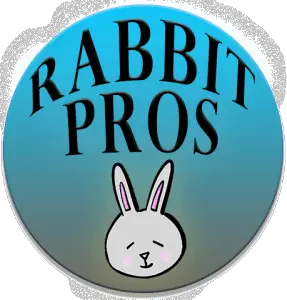Disclosure: We may earn money or products from the companies mentioned in this post.
Rabbits are chewers and some bunnies will chew on everything they can get their teeth on. And while it’s kinda cute to see a bunny chewing on a twig, it gets a lot less cute if it’s chewing on your carpet, furniture, or an electrical drop cord.
In this article, we’re going to explore why rabbits are driven to chew and how we can discourage this common bunny behavior.
Chewing is a biological need for rabbits. A rabbit’s teeth grow continuously and their drive to chew on things wears down their teeth to maintain a healthy tooth length. If a rabbit’s teeth get too long, they can’t properly eat and it would eventually be fatal.
While chewing comes innately to bunnies and while chewing is not bad per se, it can develop into something very bad. It’s not natural for rabbits to be excessively chewing.
This behavior can become quite destructive because if not corrected your bunny can begin to chew on anything and everything.
No one wants their bunny to chew on the furniture or walls and I’ve seen rabbits do both!
What’s more, rabbits can chew on something that is bad for them thus, leading to costly vet visits or worse, death. Sadly, I’ve had rabbit friends who lost their pet bunny when they chewed on an electrical cord.
A rabbit with a bad chewing problem is a big deal, but it’s also something that you can reduce or even eliminate once you understand the reason behind this chewing behavior.
In this article, I have made a list of the most common questions people ask about rabbit chewing behavior and I hope that by the end of this, you come out more enlightened and knowledgeable on this behavior to better care for your pet bunnies.
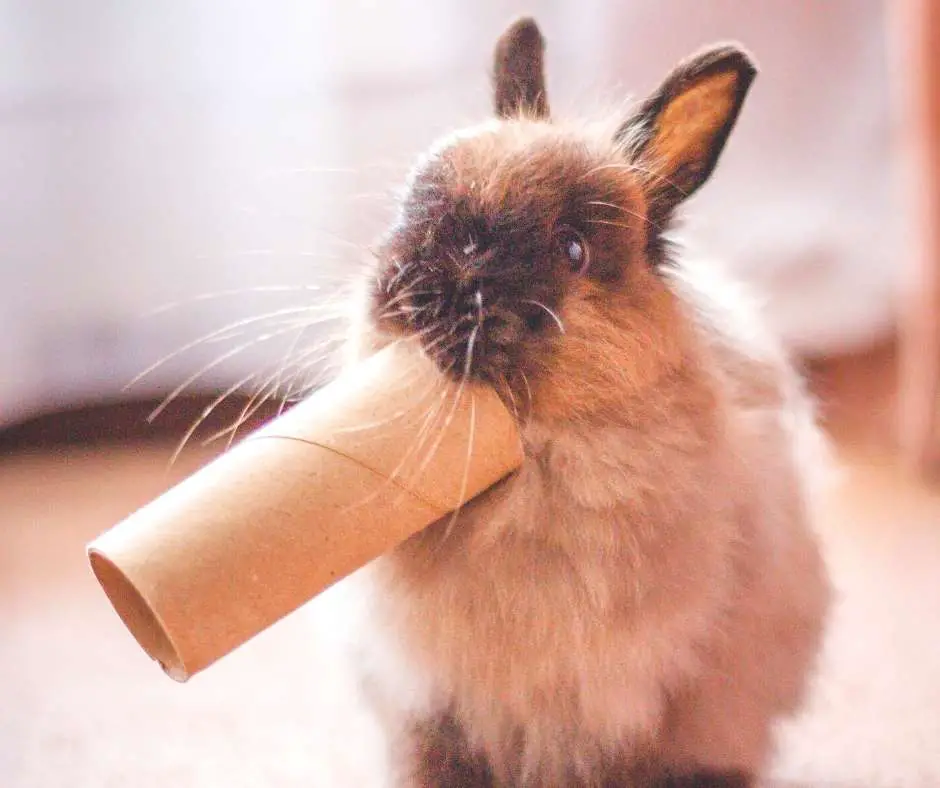
Why A Rabbit Chews On Everything
There is a biological need for rabbit chewing. Rabbits chew – and they tend to chew a lot – because it’s a fun and natural activity for them. Rabbits also need to chew because this is the only way to keep their teeth well-trimmed.
Rabbit teeth continually grow throughout their lifetime thus, they need to keep chewing to keep their teeth at a healthy length. Normally, a healthy rabbit diet will feature lots of high fiber hay which will naturally wear down their teeth in a healthy fashion.
Rabbits have a natural instinct to chew on things to wear down their continually growing teeth. However, excessive chewing isn’t a natural behavior and can have a number of causes, including a low fiber diet, nesting instincts, boredom, stress, or dental issues.
1. Low Fiber Diet
High-quality hay { Click here to see the brand we recommend on Amazon. >>> } should make up the foundation of a healthy diet for your rabbit.

Your pet bunny should have free access to fresh clean hay which will make up 80% of their diet. Munching on hay makes up a pretty substantial part of what your rabbit does all day. Each time they chew on that high fiber hay, not only are they wearing down their teeth (which they have to do), but they are loading their gut with the fiber that their digestive system requires.
If your rabbit isn’t getting enough fiber in her diet, she will look for fiber in other places, which means that she will be chewing on everything trying to find a good hay substitute.
2. Nesting Instinct
When a pregnant female rabbit (called a doe) is approaching the day she’ll give birth, she will start trying to build a nest for her litter of bunnies.
The most common way this nesting instinct manifest is by the doe filling her bed with her fur and other soft nesting material. What could make up that other ‘soft nesting material’? Anything that a doe could chew up and turn into nesting material. The most common nesting material like this is chewed-up cardboard or paper.
The other way that nesting material can manifest in chewing behavior is when a rabbit starts trying to dig a burrow to make a nest. This usually takes the form of a rabbit digging and chewing on the carpet to try to make a hole in the ground.
3. Boredom
One of the most common reasons why rabbits suddenly start to chew on everything and become destructive is because of boredom.
This is especially exhibited by rabbits who are caged all day long. Do you know how they say that dogs need their exercise, otherwise they have all this pent-up energy that they try to release by being destructive or aggressive? The same is true for rabbits.
New rabbit owners often think that because rabbits are smaller and more gentle creatures that it’s fine for them to be cooped up all day, but that’s simply not true.
Rabbits need exercise and stimulation, otherwise, a bored rabbit will try to alleviate its boredom, and yes, they will chew on anything they can reach. And just because a rabbit can’t reach your furniture doesn’t mean that their chewing behavior can’t be destructive.
Rabbits that are caged all day often chew on their cage, bed, and even chew on their plastic feeder or waterer.
4. Stress
Rabbits are creatures of habit and when their habits are messed with they get stressed. Stress can be caused by countless things, including change of schedule, change in diet, new pets, new sounds, or even being left alone.
Stress is not healthy for a rabbit, and it can cause some behavioral issues such as excessive chewing.
Try to get your bunny back in their routine and see if the chewing stops.
5. Dental Issues
If your rabbit’s teeth are starting to get a little long, their instinct is to wear those teeth down. If you’ve tried everything else to stop excessive chewing, you should inspect your rabbit’s teeth or take them to a rabbit-friendly veterinarian and ask them to take a look at your rabbit’s teeth.
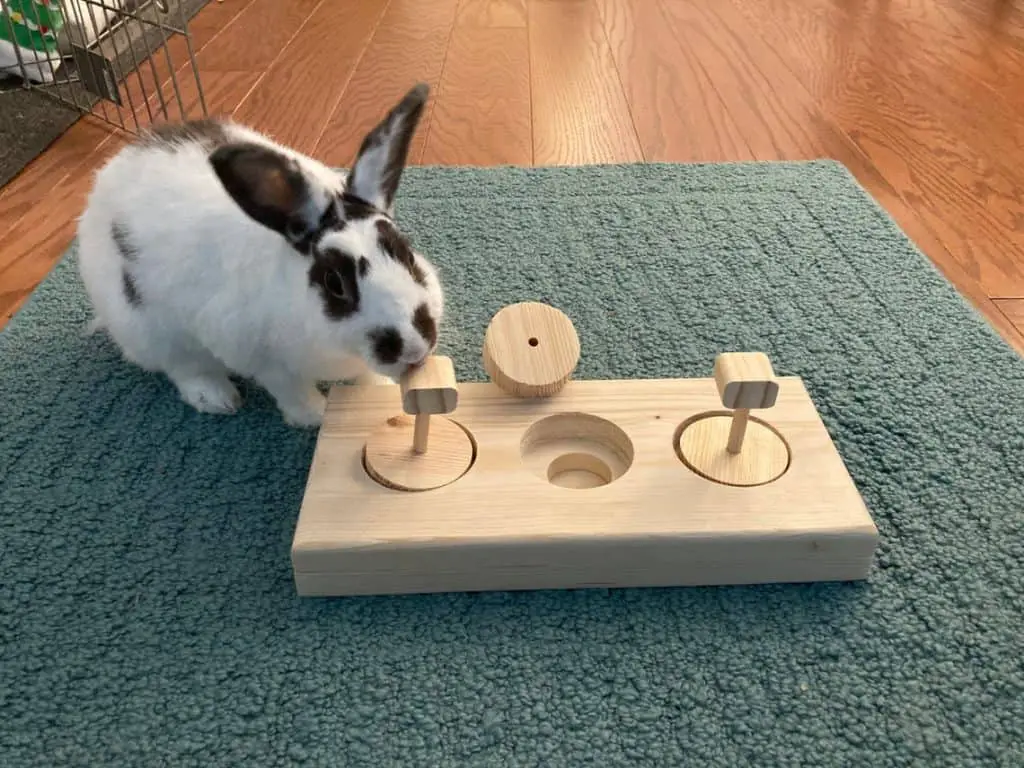
Advantages And Disadvantages Of Rabbit Chewing
We’ve mentioned that rabbits chew for different reasons some of them better than others:
| Pros Of Rabbit Chewing | Cons Of Rabbit Chewing |
|---|---|
| Chewing keeps their teeth well-trimmed | Can be destructive |
| Chewing keeps their digestive tract moving | If they chew on the wrong things, they can get sick |
| Chewing keeps rabbits busy | Can lead to more destructive behaviors |
| Chewing keeps your bunnies happy |
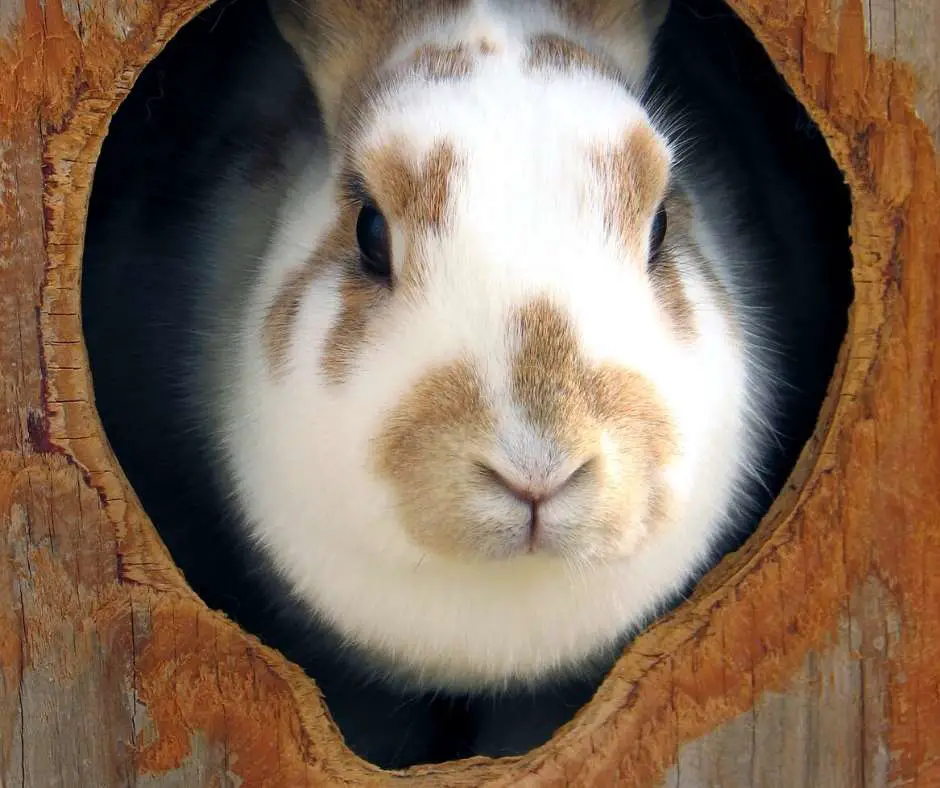
10 Tips To Stop Your Rabbit From Chewing On Everything
There are many reasons your rabbit might be chewing on everything, which means there are many things you can try to stop their excessive chewing.
1. More Exercise
A rabbit with excess energy will get into trouble. When we had our first kid, my buddy told me that a tired kid is a good kid. He was right and the same is true about rabbits.
A Tired Rabbit Is A Good Rabbit.
Make sure your rabbit has plenty of play-time outside of their rabbit hutch. They need room to roam and binky.
2. More Stimulation
Bored rabbits will chew through anything. Sometimes they can chew through their hutches or their cages and you may find yourself constantly replacing such an expensive rabbit gear. Chewing caused by boredom can easily be corrected by simply providing a more enriching experience for your rabbit.
You can also incorporate eating into their play activities:
- Hanging Baskets: Hanging baskets can mimic the act of foraging. Put some hay into some baskets and put them in a place that can easily be reached by your bunnies. Rabbits will then have to work to pull down the hay. Rabbits aren’t lazy animals so they will immensely enjoy this activity.
- Toilet Paper Tubes: You can use toilet paper tubes as hanging baskets as well by cutting holes through the tubes, stuffing them with hay, and hanging them in places around your house.
- Old Soft Blankets: providing your rabbits with old soft blankets they can use will go a long way to saving your carpets. Your rabbits can dig and nuzzle into these soft blankets. This will also do for their nesting needs.
- Cardboard Mazes: You can make rabbit mazes and fill them with hay in some places for your rabbits to go exploring. Rabbits are curious animals so long as they know that they can freely move in and out of the maze and won’t be trapped they will immensely enjoy playing inside of them.
You can find some great Bunny Brain Games from the amazing craftspeople on Etsy. Here is a link to my favorite rabbit toys on Etsy.
~Stacey
3. Supervise And Train
Do not let your rabbit roam around your home unsupervised, at least not until they’ve learned and perfected your house rules.
Allow them to roam free but also show them that there are boundaries that exist. When they start chewing on a baseboard, immediately correct them. You can use a high-pitched sound to distract them. Make sure that you correct them immediately. Correcting after the fact will not help your rabbit.
For example, you have belatedly seen that your rabbit had been chewing on your favorite furniture and so you berate your rabbit by talking loudly to them. They won’t understand and this will just cause them stress.
For curbing rabbit bad behavior, timing is key.
4. Positive Reinforcement
While timing is paramount when it comes to correcting your rabbit’s behavior, it is equally important to give them lots of positive reinforcements such as soothing praises and treats when they exhibit the correct behavior.
Gently pet your rabbit or give them treats when they start to chew on the right things such as their hay and chew toys. If you are consistent with this positive reinforcement, in time your rabbit will go out of her way to chew on the things she’s allowed to chew on.
5. Spay or Neuter Your Rabbit
I’ve always emphasized the importance of spaying or neutering rabbits. Sometimes, excessive or inappropriate rabbit chewing is a hormonally driven behavior and spaying or neutering can drastically reduce your rabbit’s need to chew things.
However, you need to also understand that although spaying and neutering can help stop this destructive behavior, it will not happen immediately. You need your rabbit’s hormones to die down first before this habit subsides and in some rabbits having them fixed won’t affect chewing behavior at all.
6. Get A Second Rabbit
Rabbits are social animals so they usually thrive better in pairs.
A second rabbit also helps soothe your rabbit as they would then have a companion to play with. Remember though that you don’t want to put a male and a female rabbit who is not sexually spayed in a cage together. Rabbits breed often and breeding happens quickly.
Also, it is still important that you provide proper stimulation and enrichment to both of your rabbits. Keep them both active and provide toys and other ways for mental stimulation. The only thing worse than having a destructive rabbit is having two destructive rabbits.
7. Try Rabbit Repellent
You can use rabbit repellent sprays to encourage your rabbit to stay away from certain areas or even certain things in your home.
These products are common with lots of brands available and are not harmful to your rabbits. These products work by adding a distasteful scent that your rabbit will not like but that you can’t even smell. When faced with these bad scents, your rabbits don’t need to take a bite before realizing that they probably should not have chewed on that thing. Instead, the scent sprayed on the surface will discourage the rabbit from exploring further.
8. Try Rabbit Chew Spray
Bitter apple sprays are also sold in the market, unlike those that use scent bitter apple sprays rely on your bunny’s taste buds. Rabbits don’t like the taste of this spray so they will definitely avoid biting on things sprayed with this. { Click here to see our favorite chew spray on Amazon. >>> }
9. Rabbit-Proof Your Home
If your rabbit is ever going to free-range, which means spending time outside of their rabbit hutch, then whatever portion of your home that they are allowed in must be made rabbit-proof; well, nothing can be rabbit-proof so you need to make it as safe as possible for your bunny and your home.
Rabbit proofing your house may help discourage your rabbit from chewing but this is not enough to curb destructive rabbit chewing in itself.
- Use puppy pens or playpens to define the rabbit area. These pens usually allow more space for your rabbits to move around rather than just keeping them in cages all they long. { Click here to see a puppy pen on Amazon. >>> } If you like to take your bunny outside like we do, then here is a short article that we wrote about our recommened rabbit playpen.
- Wire covers for your electronic’s wires will go a long way from preventing your bunnies from chewing them. Wires can be covered with flex tubings that can be found in any hardware store or here on Amazon.
- Any wooden furniture such as tables or chairs should be moved out of the rabbit area if your bunny is a chewer. Alternatively, the legs of furnature can be covered with large flex tubings so your rabbits will be discouraged from chewing the wood. Wrap tubing like this one found on Amazon works well for about any size of furnature legs.
- Keep baby gates for areas that are off-limits to rabbits. House plants should be put in a place where rabbits can’t reach or chew them. Just make sure that the space in between the bars on the gate is narrow enough that there is no chance that your bunny can squeeze through or, worse yet, get their head stuck between the bars. We prefer rabbit safe baby gates like this one on Amazon.
10. Remember to be patient
Patience is a virtue. When it comes to training rabbits and bonding with them, patience plays a key role in success.
Know that rabbits differ from one another so one rabbit will learn faster or slower than the other. Some rabbits, specifically female rabbits, are also more headstrong than male rabbits so it might be harder for you to curb their destructive behavior.
Although it can be difficult, nothing is impossible. Rabbits will eventually learn and training them will be a rewarding experience for you as their owner,
Things A Rabbit Can Chew On Safely
I’ve been talking about how your rabbits are big chewers and that it’s a totally natural, biological necessity with them. But there are things that are safe for them to chew and things that are absolutely toxic for them to chew. I have listed them below.
- Hay
- Apples
- Cardboard boxes and rolls
- Grassy mats
- Rabbit cookies/pellets
- Willow
- Aspen Branches
- Pear
- Birch and Poplar Branches
- Rose bushes
- Maple
- Kiln-Dried Pine
- Cottonwood
- Raspberry bushes
- Blackberry bushes
- Chew toys made specifically for rabbits
Things That Are NOT Safe A Rabbit To Chew On
- Electrical wiring
- Stone fruit trees
- Cedar and Pinewoods
- Elder and oak wood
- Redwood and walnut wood
- Carpet
- Plastic
- Metal
- Rubber
- Indoor plants
Frequently Asked Questions About Rabbit Chewing
Why is my rabbit chewing nothing?
If it appears as if your rabbit is chewing but is not actually chewing anything such as hay, food or the leg of your dining room table, this just means that the rabbit is trying to grind its teeth. Soft teeth grinding is a harmless habit for domestic rabbits but loud teeth grating is usually a sign of a rabbit in pain.
Rabbit teeth continually grow throughout a rabbit’s lifetime. Rabbits often chew to help keep their teeth short and well maintained or they might softly grind them together.
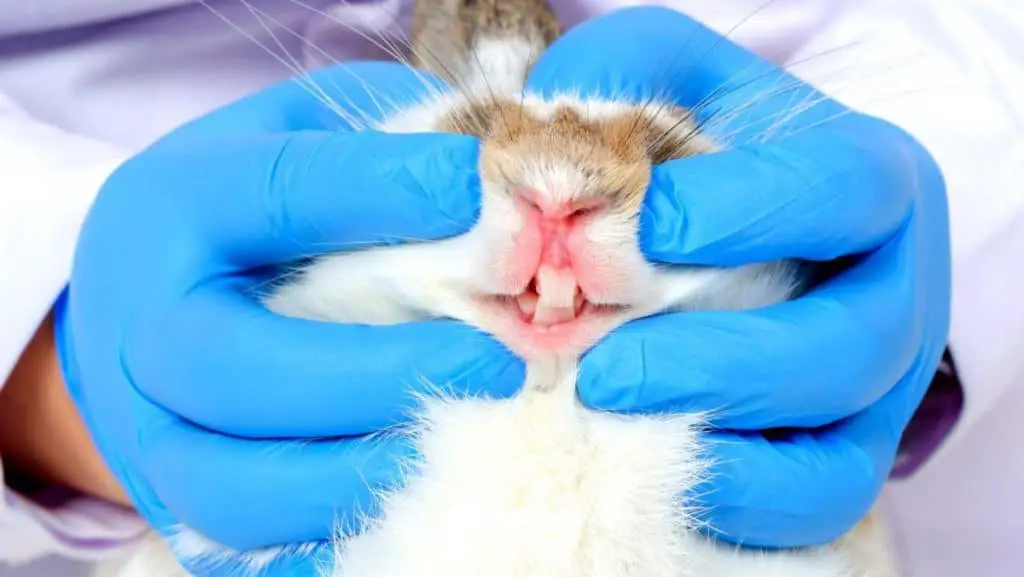
However, it is still important that you check how often your rabbit does this behavior. Dental problems can be common for rabbits, especially when their teeth grow faster than they can wear them down.
When you see this behavior, it’s usually normal and healthy. However, it can also be a sign of dental problems that will need the assistance of a rabbit experienced veterinarian.
Why did my rabbit suddenly start chewing on everything?
If a normally well-behaved rabbit suddenly begins chewing on everything, it is usually caused by either boredom or age. A bored rabbit might start destructive chewing and a rabbit that has reached sexual maturity sometimes begins excessive chewing when looking for a mate.
For rabbits that are sexually maturing, female rabbits are more likely to display this behavior. Females tend to nest even if they’re not really pregnant, so they can dig, chew and pull on their own fur to line their “nests”. This behavior can be corrected easily by spaying female rabbits. Neutering male rabbits will also reduce their bad chewing habits.
Do rabbits stop chewing as they get older?
Rabbits will not stop chewing on things as they get older. Rabbits chew for a biological need. Once they stop chewing, this could mean that they’re not feeling well and they should be taken to the vet.
Rabbit chewing in itself isn’t a bad habit, as long as your rabbits keep chewing on all the right things.
No harm in chewing hay, leafy greens, and toys but once rabbits start chewing on things that they’re not supposed to then this is a problem.
New bunny owners not only are tasked with providing care for their bunnies but also training to help their new bunnies learn the rules of the house. Positive reinforcement works for discouraging bad habits and encouraging good ones.
Neutering and Spaying also reduce lots of unwanted behaviors too. Make sure to provide enriching activities for your bunnies so they are always kept busy. Mental stimulation helps to tire your rabbits, hence a tired but happy bunny will be more occupied in resting rather than, say, chewing your favorite carpet.
What should I do if my rabbit chews on something he’s not supposed to?
So you’ve probably bunny proofed your home and have provided good distractions for your bunny but they are still able to chew something they shouldn’t, what should you do?
When your rabbit chews on something that he shouldn’t have chewed on, you should do three things: remain calm, access the danger to your rabbit healthy, and monitor for adverse health effects. Of course, at any point in this process, contacting your vet for more information is a good idea.
The first thing to remember when your pet rabbit chews on something it shouldn’t be chewing is to not panic. Panic will not help you think clearly so keeping a straight head is always recommended.
So take some deep breaths and know that the vast majority of the time when a rabbit chews on something it shouldn’t have the bunny is going to be just fine. For example, we have seen rabbits that chewed up plastic toys and bunnies that ate an actual rubber band, and in both cases, the bunny lived for their owners to tell the scary tale.
The second step that you should do is to assess what your pet bunny was chewing. Was it the carpet? Rabbits don’t usually like the taste of carpet so they usually spit it out. Was it cardboard? Or plastic? I’ve listed some of the things rabbits shouldn’t be chewing above so you could use it as a reference.
Was what they ate actually toxic or just not actually real food. If it’s toxic (as in poison) then you need to get your rabbit to the veterinarian right now! If it’s just not food, then the chances are it’s just going to pass through your bunny.
However, passing through your rabbit’s digestive system relies upon your rabbit actually eating it and not just chewing it up and spitting it out.
Check how much bad stuff your rabbit ate. So it looks like your bunny didn’t spit what they were chewing, it is now time to check how much they ingested. Rabbits can pass these bits through their poop as long as they didn’t eat a lot of it. For example, eating the head and arm off of a plastic army guy probably isn’t going to be a big deal. However, if your bunny ate that toy soldier’s tank, you probably should visit your vet ASAP.
Do not try to make your rabbits vomit. You can’t. Rabbits can’t vomit, burp or belch. Their digestive tracts do not work that way. If your rabbit ingested lots of the toxic stuff then immediately bring them to the vet. If they ingested a tiny amount of potentially toxic stuff then you should observe them for changes or signs of distress.
- Lethargy: check if your bunnies suddenly lose appetite and have significantly reduced activity levels.
- Sore tummies: a sore abdomen is a sure sign that something has been ingested and that the body is reacting to it
- Bloody/misshapen stools: check if rabbit pellets lose their circular shape or if your rabbit is passing blood.
It is also important to keep your rabbit hydrated as this aids in their digestive function. If any changes to your rabbit occur immediately take them to the vet.
We hope this article helped you gain a better understanding of your pet rabbit’s chewing habits. If we missed answering your question, send us an email or visit our rabbit group on Facebook.
